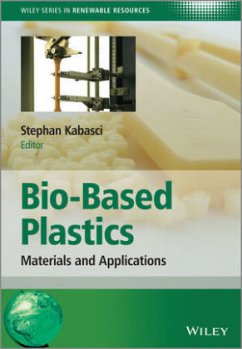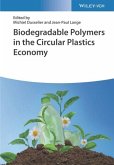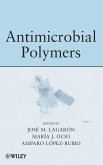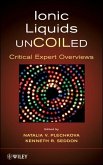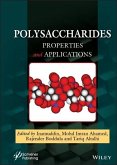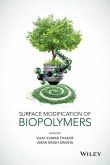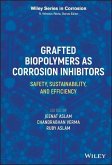Bio-Based Plastics
Materials and Applications
Herausgegeben von Kabasci, Stephan; Stevens, Christian
Bio-Based Plastics
Materials and Applications
Herausgegeben von Kabasci, Stephan; Stevens, Christian
- Gebundenes Buch
- Merkliste
- Auf die Merkliste
- Bewerten Bewerten
- Teilen
- Produkt teilen
- Produkterinnerung
- Produkterinnerung
The field of bio-based plastics has developed significantly in the last 10 years and there is increasing pressure on industries to shift existing materials production from petrochemicals to renewables.
Bio-based Plastics presents an up-to-date overview of the basic and applied aspects of bioplastics, focusing primarily on thermoplastic polymers for material use. Emphasizing materials currently in use or with significant potential for future applications, this book looks at the most important biopolymer classes such as polysaccharides, lignin, proteins and polyhydroxyalkanoates as raw…mehr
Andere Kunden interessierten sich auch für
![Biodegradable Polymers in the Circular Plastics Economy Biodegradable Polymers in the Circular Plastics Economy]() Biodegradable Polymers in the Circular Plastics Economy175,75 €
Biodegradable Polymers in the Circular Plastics Economy175,75 €![Antimicrobial Polymers Antimicrobial Polymers]() Jose M. LagaronAntimicrobial Polymers169,99 €
Jose M. LagaronAntimicrobial Polymers169,99 €![Ionic Liquids Uncoiled Ionic Liquids Uncoiled]() Kenneth R. Seddon / Natalia V. Plechkova (Hrsg.)Ionic Liquids Uncoiled176,99 €
Kenneth R. Seddon / Natalia V. Plechkova (Hrsg.)Ionic Liquids Uncoiled176,99 €![Polysaccharides Polysaccharides]() Polysaccharides284,99 €
Polysaccharides284,99 €![Patent Applications Patent Applications]() Thomas F. DeRosaPatent Applications247,99 €
Thomas F. DeRosaPatent Applications247,99 €![Surface Modification of Biopolymers Surface Modification of Biopolymers]() Surface Modification of Biopolymers159,99 €
Surface Modification of Biopolymers159,99 €![Grafted Biopolymers as Corrosion Inhibitors Grafted Biopolymers as Corrosion Inhibitors]() Grafted Biopolymers as Corrosion Inhibitors222,99 €
Grafted Biopolymers as Corrosion Inhibitors222,99 €-
-
-
The field of bio-based plastics has developed significantly in the last 10 years and there is increasing pressure on industries to shift existing materials production from petrochemicals to renewables.
Bio-based Plastics presents an up-to-date overview of the basic and applied aspects of bioplastics, focusing primarily on thermoplastic polymers for material use. Emphasizing materials currently in use or with significant potential for future applications, this book looks at the most important biopolymer classes such as polysaccharides, lignin, proteins and polyhydroxyalkanoates as raw materials for bio-based plastics, as well as materials derived from bio-based monomers like lipids, poly(lactic acid), polyesters, polyamides and polyolefines. Detailed consideration is also given to the market and availability of renewable raw materials, the importance of bio-based content and the aspect of biodegradability.
Topics covered include:
Starch
Cellulose and cellulose acetate
Materials based on chitin and chitosan
Lignin matrix composites from natural resources
Polyhydroxyalkanoates
Poly(lactic acid)
Polyesters, Polyamides and Polyolefins from biomass derived monomers
Protein-based plastics
Bio-based Plastics is a valuable resource for academic and industrial researchers who are interested in new materials, renewable resources, sustainability and polymerization technology. It will also prove useful for advanced students interested in the development of bio-based products and materials, green and sustainable chemistry, polymer chemistry and materials science.
For more information on the Wiley Series in Renewable Resources, visit www.wiley.com/go/rrs
Hinweis: Dieser Artikel kann nur an eine deutsche Lieferadresse ausgeliefert werden.
Bio-based Plastics presents an up-to-date overview of the basic and applied aspects of bioplastics, focusing primarily on thermoplastic polymers for material use. Emphasizing materials currently in use or with significant potential for future applications, this book looks at the most important biopolymer classes such as polysaccharides, lignin, proteins and polyhydroxyalkanoates as raw materials for bio-based plastics, as well as materials derived from bio-based monomers like lipids, poly(lactic acid), polyesters, polyamides and polyolefines. Detailed consideration is also given to the market and availability of renewable raw materials, the importance of bio-based content and the aspect of biodegradability.
Topics covered include:
Starch
Cellulose and cellulose acetate
Materials based on chitin and chitosan
Lignin matrix composites from natural resources
Polyhydroxyalkanoates
Poly(lactic acid)
Polyesters, Polyamides and Polyolefins from biomass derived monomers
Protein-based plastics
Bio-based Plastics is a valuable resource for academic and industrial researchers who are interested in new materials, renewable resources, sustainability and polymerization technology. It will also prove useful for advanced students interested in the development of bio-based products and materials, green and sustainable chemistry, polymer chemistry and materials science.
For more information on the Wiley Series in Renewable Resources, visit www.wiley.com/go/rrs
Hinweis: Dieser Artikel kann nur an eine deutsche Lieferadresse ausgeliefert werden.
Produktdetails
- Produktdetails
- Wiley Series in Renewable Resources
- Verlag: Wiley & Sons / Wiley-Blackwell
- 1. Auflage
- Seitenzahl: 392
- Erscheinungstermin: 16. Dezember 2013
- Englisch
- Abmessung: 251mm x 177mm x 25mm
- Gewicht: 748g
- ISBN-13: 9781119994008
- ISBN-10: 1119994004
- Artikelnr.: 38106052
- Herstellerkennzeichnung
- Libri GmbH
- Europaallee 1
- 36244 Bad Hersfeld
- gpsr@libri.de
- Wiley Series in Renewable Resources
- Verlag: Wiley & Sons / Wiley-Blackwell
- 1. Auflage
- Seitenzahl: 392
- Erscheinungstermin: 16. Dezember 2013
- Englisch
- Abmessung: 251mm x 177mm x 25mm
- Gewicht: 748g
- ISBN-13: 9781119994008
- ISBN-10: 1119994004
- Artikelnr.: 38106052
- Herstellerkennzeichnung
- Libri GmbH
- Europaallee 1
- 36244 Bad Hersfeld
- gpsr@libri.de
Editor Stephan Kabasci Fraunhofer-Institute for Environmental, Safety, and Energy Technology UMSICHT, Germany Series Editor Christian Stevens Faculty of Bioscience Engineering, Ghent University, Ghent, Belgium
Series Preface xiii Preface xv List of Contributors xvii 1 Bio-Based Plastics - Introduction 1 Stephan Kabasci 1.1 Definition of Bio-Based Plastics 2 1.2 A Brief History of Bio-Based Plastics 3 1.3 Market for Bio-Based Plastics 5 1.4 Scope of the Book 6 2 Starch 9 Catia Bastioli, Paolo Magistrali, and Sebastia Gestý Garcia 2.1 Introduction 9 2.2 Starch 10 2.3 Starch-Filled Plastics 13 2.4 Structural Starch Modifications 14 2.4.1 Starch Gelatinization and Retrogradation 14 2.4.2 Starch Jet-Cooking 16 2.4.3 Starch Extrusion Cooking 16 2.4.4 Starch Destructurization in Absence of Synthetic Polymers 17 2.4.5 Starch Destructurization in Presence of Synthetic Polymers 19 2.4.6 Additional Information on Starch Complexation 23 2.5 Starch-Based Materials on the Market 27 2.6 Conclusions 28 References 28 3 Cellulose and Cellulose Acetate 35 Johannes Ganster and Hans-Peter Fink 3.1 Introduction 35 3.2 Raw Materials 36 3.3 Structure 37 3.3.1 Cellulose 37 3.3.2 Cellulose Derivatives 40 3.4 Principles of Cellulose Technology 42 3.4.1 Regenerated Cellulose 43 3.4.2 Organic Cellulose Esters - Cellulose Acetate 46 3.5 Properties and Applications of Cellulose-Based Plastics 52 3.5.1 Fibres 53 3.5.2 Films 54 3.5.3 Moulded Articles 56 3.6 Some Recent Developments 57 3.6.1 Cellulose 57 3.6.2 Cellulose Acetate and Mixed Esters 58 3.7 Conclusion 59 References 59 4 Materials Based on Chitin and Chitosan 63 Marguerite Rinaudo 4.1 Introduction 63 4.2 Preparation and Characterization of Chitin and Chitosan 64 4.2.1 Chitin: Characteristics and Characterization 64 4.2.2 Chitosan: Preparation and Characterization 66 4.3 Processing of Chitin to Materials and Applications 69 4.3.1 Processing of Chitin and Physical Properties of Materials 69 4.3.2 Applications of Chitin-Based Materials 70 4.4 Chitosan Processing to Materials and Applications 71 4.4.1 Processing of Chitosan 71 4.4.2 Application of Chitosan-Based Materials 74 4.5 Conclusion 77 References 77 5 Lignin Matrix Composites from Natural Resources - ARBOFORMR 89 Helmut N
agele, J
urgen Pfitzer, Lars Ziegler, Emilia Regina Inone-Kauffmann, Wilhelm Eckl, and Norbert Eisenreich 5.1 Introduction 89 5.2 Approaches for Plastics Completely Made from Natural Resources 90 5.3 Formulation of Lignin Matrix Composites (ARBOFORM) 92 5.3.1 Lignin 92 5.3.2 Basic Formulations and Processing of ARBOFORM 95 5.3.3 The Influence of the Fibre Content 97 5.4 Chemical Free Lignin from High Pressure Thermo-Hydrolysis (Aquasolv) 100 5.4.1 Near Infrared Spectroscopy of Lignin Types 100 5.4.2 Lignin Extraction by High-Pressure Hydrothermolysis (HPH) 101 5.4.3 Thermoplastic Processing of Aquasolv Lignin 104 5.5 Functionalizing Lignin Matrix Composites 105 5.5.1 Impact Strength 106 5.5.2 Flame Retardancy 106 5.5.3 Electrical Conductivity with Nanoparticles 106 5.5.4 Pyrolysis to Porous Carbonaceous Structures 108 5.6 Injection Moulding of Parts - Case Studies 109 5.6.1 Loudspeaker Boxes 110 5.6.2 Precision Parts 110 5.6.3 Thin Walled and Decorative Gift Boxes and Toys 111 5.6 Acknowledgements 112 References 112 6 Bioplastics from Lipids 117 Stuart Coles 6.1 Introduction 117 6.2 Definition and Structure of Lipids 117 6.2.1 Fatty Acids 117 6.2.2 Mono-, Di- and Tri-Substituted Glycerols 118 6.2.3 Phospholipids 118 6.2.4 Other Compounds 119 6.3 Sources and Biosynthesis of Lipids 119 6.3.1 Sources of Lipids 119 6.3.2 Biosynthesis of Lipids 120 6.3.3 Composition of Triglycerides 120 6.4 Extraction of Plant Oils, Triglycerides and their Associated Compounds 120 6.4.1 Seed Cleaning and Preparation 121 6.4.2 Seed Pressing 121 6.4.3 Liquid Extraction 121 6.4.4 Post Extraction Processing 122 6.5 Biopolymers from Plant Oils, Triglycerides and Their Associated Compounds 122 6.5.1 Generic Triglycerides 122 6.5.2 Common Manipulations of Triglycerides 123 6.5.3 Soybean Oil-Based Bioplastics 125 6.5.4 Castor Oil-Based Bioplastics 126 6.5.5 Linseed Oil-Based Bioplastics 127 6.5.6 Other Plant Oil-Based Bioplastics 127 6.5.7 Biological Synthesis of Polymers 128 6.6 Applications 128 6.6.1 Mimicking to Reduce R&D Risk 128 6.6.2 Composites 129 6.6.3 Coatings 129 6.6.4 Packaging Materials 130 6.6.5 Foams 130 6.6.6 Biomedical Applications 130 6.6.7 Other Applications 131 6.7 Conclusions 131 References 131 7 Polyhydroxyalkanoates: Basics, Production and Applications of Microbial Biopolyesters 137 Martin Koller, Anna Salerno, and Gerhart Braunegg 7.1 Microbial PHA Production, Metabolism, and Structure 137 7.1.1 Occurrence of PHAs 137 7.1.2 In Vivo Characteristics and Biological Role of PHAs 139 7.1.3 Structure and Composition of PHAs 140 7.1.4 Metabolic Aspects 141 7.2 Available Raw Materials for PHA Production 143 7.3 Recovery of PHA from Biomass 144 7.3.1 General Aspects of PHA Recovery 144 7.3.2 Direct Extraction of PHA from Biomass 146 7.3.3 Digestion of the non-PHA Cellular Material 147 7.3.4 Disruption of Cells of Osmophilic Microbes in Hypotonic Medium 148 7.4 Different Types of PHA 149 7.4.1 Short Chain Length vs. Medium Chain Length PHAs 149 7.4.2 Enzymatic Background: PHA Synthases 149 7.5 Global PHA Production 151 7.6 Applications of PHAs 152 7.6.1 General 152 7.6.2 Packaging and Commodity Items 152 7.6.3 Medical Applications 154 7.6.4 Application of the Monomeric Building Blocks 155 7.6.5 Smart Materials 156 7.6.6 Controlled Release of Active Agents 156 7.7 Economic Challenges in the Production of PHAs and Attempts to Overcome Them 156 7.7.1 PHA Production as a Holistic Process 156 7.7.2 Substrates as Economic Factor 156 7.7.3 Downstream Processing 157 7.7.4 Process Design 157 7.7.5 Contemporary Attempts to Enhance PHA Production in Terms of Economics and Product Quality 158 7.8 Process Design 160 7.9 Conclusion 162 References 163 8 Poly(Lactic Acid) 171 Hideto Tsuji 8.1 Introduction 171 8.2 Historical Outline 173 8.3 Synthesis of Monomer 174 8.4 Synthesis of Poly(Lactic Acid) 176 8.4.1 Homopolymers 176 8.4.2 Linear Copolymers 176 8.5 Processing 178 8.6 Crystallization 178 8.6.1 Crystal Structures 178 8.6.2 Crystalline Morphology 181 8.6.3 Crystallization Behaviour 182 8.7 Physical Properties 182 8.7.1 Mechanical Properties 182 8.7.2 Thermal Properties 186 8.7.3 Permeability 188 8.7.4 Surface Properties 188 8.7.5 Electrical Properties 189 8.7.6 Optical Properties (From Biopolymers) 189 8.8 Hydrolytic Degradation 191 8.8.1 Degradation Mechanism 192 8.8.2 Effects of Surrounding Media 195 8.8.3 Effects of Material Parameters 196 8.9 Thermal Degradation 200 8.10 Biodegradation 203 8.11 Photodegradation 204 8.12 High-Performance Poly(Lactic Acid)-Based Materials 206 8.12.1 Nucleating or Crystallization-Accelerating Fillers 206 8.12.2 Composites and Nanocomposites 208 8.12.3 Fibre-Reinforced Plastics (FRPs) 211 8.12.4 Stereocomplexation 211 8.13 Applications 212 8.13.1 Alternatives to Petro-Based Polymers 212 8.13.2 Biomedical 213 8.13.3 Environmental Applications 215 8.14 Recycling 217 8.15 Conclusions 218 References 219 9 Other Polyesters from Biomass Derived Monomers 241 Daan S. van Es, Frits van der Klis, Rutger J. I. Knoop, Karin Molenveld, Lolke Sijtsma, and Jacco van Haveren 9.1 Introduction 241 9.2 Isohexide Polyesters 242 9.2.1 Introduction 242 9.2.2 Semi-Aromatic Homo-Polyesters 244 9.2.3 Semi-Aromatic Co-Polyesters 247 9.2.4 Aliphatic Polyesters 248 9.2.5 Modified Isohexides 250 9.3 Furan-Based Polyesters 251 9.3.1 Introduction 251 9.3.2 2,5-Dihydroxymethylfuran (DHMF)-Based Polyesters 253 9.3.3 5-Hydroxymethylfuroic Acid (HMFA) Based Polyesters 254 9.3.4 Furan-2,5-Dicarboxylic Acid (FDCA) Based Polyesters 254 9.3.5 Future Outlook 256 9.4 Poly(Butylene Succinate) (PBS) and Its Copolymers 257 9.4.1 Succinic Acid 257 9.4.2 1,4-Butanediol (BDO) 258 9.4.3 Poly(Butylene Succinate) (PBS) 259 9.4.4 PBS Copolymers 259 9.4.5 PBS Biodegradability 260 9.4.6 PBS Processability 260 9.4.7 PBS Blends 260 9.4.8 PBS Markets and Applications 260 9.4.9 Future Outlook 261 9.5 Bio-Based Terephthalates 261 9.5.1 Introduction 261 9.5.2 Bio-Based Diols: Ethylene Glycol, 1,3-Propanediol, 1,4-Butanediol 262 9.5.3 Bio-Based Xylenes, Isophthalic and Terephthalic Acid 263 9.6 Conclusions 267 References 267 10 Polyamides from Biomass Derived Monomers 275 Benjamin Brehmer 10.1 Introduction 275 10.1.1 What are Polyamides? 275 10.1.2 What is the Polymer Pyramid? 276 10.1.3 Where Do Polyamides from Biomass Derived Monomers Fit? 277 10.2 Technical Performance of Polyamides 277 10.2.1 How to Differentiate Performance 277 10.2.2 Overview of Current Applications 279 10.2.3 Typical Association of Biopolymers 280 10.3 Chemical Synthesis 281 10.3.1 Castor Bean to Intermediates 281 10.3.2 Undecenoic Acid Route 283 10.3.3 Sebacic Acid Route 283 10.3.4 Decamethylene Diamine Route 284 10.4 Monomer Feedstock Supply Chain 284 10.4.1 Description of Supply Chain 284 10.4.2 Pricing Situation 285 10.5 Producers 287 10.6 Sustainability Aspects 287 10.6.1 Biosourcing 287 10.6.2 Lifecycle Assessments 288 10.6.3 Labelling and Certification 291 10.7 Improvement and Outlook 292 References 293 11 Polyolefin-Based Plastics from Biomass-Derived Monomers 295 R.J. Koopmans 11.1 Introduction 295 11.2 Polyolefin-Based Plastics 296 11.3 Biomass 299 11.4 Chemicals from Biomass 300 11.5 Chemicals from Biotechnology 302 11.6 Plastics from Biomass 303 11.7 Polyolefin Plastics from Biomass and Petrochemical Technology 303 11.7.1 One-Carbon Building Blocks 304 11.7.2 Two-Carbon Building Blocks 305 11.7.3 Three-Carbon Building Blocks 305 11.8 Polyolefin Plastics from Biomass and Biotechnology 305 11.9 Bio-Polyethylene and Bio-Polypropylene 306 11.10 Perspective and Outlook 307 References 308 12 Future Trends for Recombinant Protein-Based Polymers: The Case Study of Development and Application of Silk-Elastin-Like Polymers 311 Margarida Casal, Ant
onio M. Cunha, and Raul Machado 12.1 Introduction 311 12.2 Production of Recombinant Protein-Based Polymers (rPBPs) 312 12.3 The Silk-Elastin-Like Polymers (SELPs) 314 12.3.1 SELPs for Biomedical Applications: Hydrogels for Localized Delivery 317 12.3.2 Mechanical Properties of SELP Hydrogels 319 12.3.3 Spun Fibres 320 12.3.4 Solvent Cast Films 323 12.4 Final Considerations 324 References 325 13 Renewable Raw Materials and Feedstock for Bioplastics 331 Achim Raschka, Michael Carus, and Stephan Piotrowski 13.1 Introduction 331 13.2 First- and Second-Generation Crops: Advantages and Disadvantages 331 13.3 The Amount of Land Needed to Grow Feedstock for Bio-Based Plastics 333 13.4 Productivity and Availability of Arable Land 336 13.5 Research on Feedstock Optimization 338 13.6 Advanced Breeding Technologies and Green Biotechnology 339 13.7 Some Facts about Food Prices and Recent Food Price Increases 341 13.8 Is there Enough Land for Food, Animal Feed, Bioenergy and Industrial Material Use, Including Bio-Based Plastics? 343 References 345 14 The Promise of Bioplastics - Biobased and Biodegradable-Compostable Plastics 347 Ramani Narayan 14.1 Value Proposition for Bio-Based Plastics 348 14.2 Exemplars of Zero or Reduced Material Carbon Footprint - Bio-PE, Bio-PET and PLA 349 14.3 Process Carbon Footprint and LCA 351 14.4 Determination of Bio-Based Carbon Content 352 14.5 End-of-Life Options for Bioplastics - Biodegradability-Compostability 353 14.6 Summary 356 References 356 Index
agele, J
urgen Pfitzer, Lars Ziegler, Emilia Regina Inone-Kauffmann, Wilhelm Eckl, and Norbert Eisenreich 5.1 Introduction 89 5.2 Approaches for Plastics Completely Made from Natural Resources 90 5.3 Formulation of Lignin Matrix Composites (ARBOFORM) 92 5.3.1 Lignin 92 5.3.2 Basic Formulations and Processing of ARBOFORM 95 5.3.3 The Influence of the Fibre Content 97 5.4 Chemical Free Lignin from High Pressure Thermo-Hydrolysis (Aquasolv) 100 5.4.1 Near Infrared Spectroscopy of Lignin Types 100 5.4.2 Lignin Extraction by High-Pressure Hydrothermolysis (HPH) 101 5.4.3 Thermoplastic Processing of Aquasolv Lignin 104 5.5 Functionalizing Lignin Matrix Composites 105 5.5.1 Impact Strength 106 5.5.2 Flame Retardancy 106 5.5.3 Electrical Conductivity with Nanoparticles 106 5.5.4 Pyrolysis to Porous Carbonaceous Structures 108 5.6 Injection Moulding of Parts - Case Studies 109 5.6.1 Loudspeaker Boxes 110 5.6.2 Precision Parts 110 5.6.3 Thin Walled and Decorative Gift Boxes and Toys 111 5.6 Acknowledgements 112 References 112 6 Bioplastics from Lipids 117 Stuart Coles 6.1 Introduction 117 6.2 Definition and Structure of Lipids 117 6.2.1 Fatty Acids 117 6.2.2 Mono-, Di- and Tri-Substituted Glycerols 118 6.2.3 Phospholipids 118 6.2.4 Other Compounds 119 6.3 Sources and Biosynthesis of Lipids 119 6.3.1 Sources of Lipids 119 6.3.2 Biosynthesis of Lipids 120 6.3.3 Composition of Triglycerides 120 6.4 Extraction of Plant Oils, Triglycerides and their Associated Compounds 120 6.4.1 Seed Cleaning and Preparation 121 6.4.2 Seed Pressing 121 6.4.3 Liquid Extraction 121 6.4.4 Post Extraction Processing 122 6.5 Biopolymers from Plant Oils, Triglycerides and Their Associated Compounds 122 6.5.1 Generic Triglycerides 122 6.5.2 Common Manipulations of Triglycerides 123 6.5.3 Soybean Oil-Based Bioplastics 125 6.5.4 Castor Oil-Based Bioplastics 126 6.5.5 Linseed Oil-Based Bioplastics 127 6.5.6 Other Plant Oil-Based Bioplastics 127 6.5.7 Biological Synthesis of Polymers 128 6.6 Applications 128 6.6.1 Mimicking to Reduce R&D Risk 128 6.6.2 Composites 129 6.6.3 Coatings 129 6.6.4 Packaging Materials 130 6.6.5 Foams 130 6.6.6 Biomedical Applications 130 6.6.7 Other Applications 131 6.7 Conclusions 131 References 131 7 Polyhydroxyalkanoates: Basics, Production and Applications of Microbial Biopolyesters 137 Martin Koller, Anna Salerno, and Gerhart Braunegg 7.1 Microbial PHA Production, Metabolism, and Structure 137 7.1.1 Occurrence of PHAs 137 7.1.2 In Vivo Characteristics and Biological Role of PHAs 139 7.1.3 Structure and Composition of PHAs 140 7.1.4 Metabolic Aspects 141 7.2 Available Raw Materials for PHA Production 143 7.3 Recovery of PHA from Biomass 144 7.3.1 General Aspects of PHA Recovery 144 7.3.2 Direct Extraction of PHA from Biomass 146 7.3.3 Digestion of the non-PHA Cellular Material 147 7.3.4 Disruption of Cells of Osmophilic Microbes in Hypotonic Medium 148 7.4 Different Types of PHA 149 7.4.1 Short Chain Length vs. Medium Chain Length PHAs 149 7.4.2 Enzymatic Background: PHA Synthases 149 7.5 Global PHA Production 151 7.6 Applications of PHAs 152 7.6.1 General 152 7.6.2 Packaging and Commodity Items 152 7.6.3 Medical Applications 154 7.6.4 Application of the Monomeric Building Blocks 155 7.6.5 Smart Materials 156 7.6.6 Controlled Release of Active Agents 156 7.7 Economic Challenges in the Production of PHAs and Attempts to Overcome Them 156 7.7.1 PHA Production as a Holistic Process 156 7.7.2 Substrates as Economic Factor 156 7.7.3 Downstream Processing 157 7.7.4 Process Design 157 7.7.5 Contemporary Attempts to Enhance PHA Production in Terms of Economics and Product Quality 158 7.8 Process Design 160 7.9 Conclusion 162 References 163 8 Poly(Lactic Acid) 171 Hideto Tsuji 8.1 Introduction 171 8.2 Historical Outline 173 8.3 Synthesis of Monomer 174 8.4 Synthesis of Poly(Lactic Acid) 176 8.4.1 Homopolymers 176 8.4.2 Linear Copolymers 176 8.5 Processing 178 8.6 Crystallization 178 8.6.1 Crystal Structures 178 8.6.2 Crystalline Morphology 181 8.6.3 Crystallization Behaviour 182 8.7 Physical Properties 182 8.7.1 Mechanical Properties 182 8.7.2 Thermal Properties 186 8.7.3 Permeability 188 8.7.4 Surface Properties 188 8.7.5 Electrical Properties 189 8.7.6 Optical Properties (From Biopolymers) 189 8.8 Hydrolytic Degradation 191 8.8.1 Degradation Mechanism 192 8.8.2 Effects of Surrounding Media 195 8.8.3 Effects of Material Parameters 196 8.9 Thermal Degradation 200 8.10 Biodegradation 203 8.11 Photodegradation 204 8.12 High-Performance Poly(Lactic Acid)-Based Materials 206 8.12.1 Nucleating or Crystallization-Accelerating Fillers 206 8.12.2 Composites and Nanocomposites 208 8.12.3 Fibre-Reinforced Plastics (FRPs) 211 8.12.4 Stereocomplexation 211 8.13 Applications 212 8.13.1 Alternatives to Petro-Based Polymers 212 8.13.2 Biomedical 213 8.13.3 Environmental Applications 215 8.14 Recycling 217 8.15 Conclusions 218 References 219 9 Other Polyesters from Biomass Derived Monomers 241 Daan S. van Es, Frits van der Klis, Rutger J. I. Knoop, Karin Molenveld, Lolke Sijtsma, and Jacco van Haveren 9.1 Introduction 241 9.2 Isohexide Polyesters 242 9.2.1 Introduction 242 9.2.2 Semi-Aromatic Homo-Polyesters 244 9.2.3 Semi-Aromatic Co-Polyesters 247 9.2.4 Aliphatic Polyesters 248 9.2.5 Modified Isohexides 250 9.3 Furan-Based Polyesters 251 9.3.1 Introduction 251 9.3.2 2,5-Dihydroxymethylfuran (DHMF)-Based Polyesters 253 9.3.3 5-Hydroxymethylfuroic Acid (HMFA) Based Polyesters 254 9.3.4 Furan-2,5-Dicarboxylic Acid (FDCA) Based Polyesters 254 9.3.5 Future Outlook 256 9.4 Poly(Butylene Succinate) (PBS) and Its Copolymers 257 9.4.1 Succinic Acid 257 9.4.2 1,4-Butanediol (BDO) 258 9.4.3 Poly(Butylene Succinate) (PBS) 259 9.4.4 PBS Copolymers 259 9.4.5 PBS Biodegradability 260 9.4.6 PBS Processability 260 9.4.7 PBS Blends 260 9.4.8 PBS Markets and Applications 260 9.4.9 Future Outlook 261 9.5 Bio-Based Terephthalates 261 9.5.1 Introduction 261 9.5.2 Bio-Based Diols: Ethylene Glycol, 1,3-Propanediol, 1,4-Butanediol 262 9.5.3 Bio-Based Xylenes, Isophthalic and Terephthalic Acid 263 9.6 Conclusions 267 References 267 10 Polyamides from Biomass Derived Monomers 275 Benjamin Brehmer 10.1 Introduction 275 10.1.1 What are Polyamides? 275 10.1.2 What is the Polymer Pyramid? 276 10.1.3 Where Do Polyamides from Biomass Derived Monomers Fit? 277 10.2 Technical Performance of Polyamides 277 10.2.1 How to Differentiate Performance 277 10.2.2 Overview of Current Applications 279 10.2.3 Typical Association of Biopolymers 280 10.3 Chemical Synthesis 281 10.3.1 Castor Bean to Intermediates 281 10.3.2 Undecenoic Acid Route 283 10.3.3 Sebacic Acid Route 283 10.3.4 Decamethylene Diamine Route 284 10.4 Monomer Feedstock Supply Chain 284 10.4.1 Description of Supply Chain 284 10.4.2 Pricing Situation 285 10.5 Producers 287 10.6 Sustainability Aspects 287 10.6.1 Biosourcing 287 10.6.2 Lifecycle Assessments 288 10.6.3 Labelling and Certification 291 10.7 Improvement and Outlook 292 References 293 11 Polyolefin-Based Plastics from Biomass-Derived Monomers 295 R.J. Koopmans 11.1 Introduction 295 11.2 Polyolefin-Based Plastics 296 11.3 Biomass 299 11.4 Chemicals from Biomass 300 11.5 Chemicals from Biotechnology 302 11.6 Plastics from Biomass 303 11.7 Polyolefin Plastics from Biomass and Petrochemical Technology 303 11.7.1 One-Carbon Building Blocks 304 11.7.2 Two-Carbon Building Blocks 305 11.7.3 Three-Carbon Building Blocks 305 11.8 Polyolefin Plastics from Biomass and Biotechnology 305 11.9 Bio-Polyethylene and Bio-Polypropylene 306 11.10 Perspective and Outlook 307 References 308 12 Future Trends for Recombinant Protein-Based Polymers: The Case Study of Development and Application of Silk-Elastin-Like Polymers 311 Margarida Casal, Ant
onio M. Cunha, and Raul Machado 12.1 Introduction 311 12.2 Production of Recombinant Protein-Based Polymers (rPBPs) 312 12.3 The Silk-Elastin-Like Polymers (SELPs) 314 12.3.1 SELPs for Biomedical Applications: Hydrogels for Localized Delivery 317 12.3.2 Mechanical Properties of SELP Hydrogels 319 12.3.3 Spun Fibres 320 12.3.4 Solvent Cast Films 323 12.4 Final Considerations 324 References 325 13 Renewable Raw Materials and Feedstock for Bioplastics 331 Achim Raschka, Michael Carus, and Stephan Piotrowski 13.1 Introduction 331 13.2 First- and Second-Generation Crops: Advantages and Disadvantages 331 13.3 The Amount of Land Needed to Grow Feedstock for Bio-Based Plastics 333 13.4 Productivity and Availability of Arable Land 336 13.5 Research on Feedstock Optimization 338 13.6 Advanced Breeding Technologies and Green Biotechnology 339 13.7 Some Facts about Food Prices and Recent Food Price Increases 341 13.8 Is there Enough Land for Food, Animal Feed, Bioenergy and Industrial Material Use, Including Bio-Based Plastics? 343 References 345 14 The Promise of Bioplastics - Biobased and Biodegradable-Compostable Plastics 347 Ramani Narayan 14.1 Value Proposition for Bio-Based Plastics 348 14.2 Exemplars of Zero or Reduced Material Carbon Footprint - Bio-PE, Bio-PET and PLA 349 14.3 Process Carbon Footprint and LCA 351 14.4 Determination of Bio-Based Carbon Content 352 14.5 End-of-Life Options for Bioplastics - Biodegradability-Compostability 353 14.6 Summary 356 References 356 Index
Series Preface xiii Preface xv List of Contributors xvii 1 Bio-Based Plastics - Introduction 1 Stephan Kabasci 1.1 Definition of Bio-Based Plastics 2 1.2 A Brief History of Bio-Based Plastics 3 1.3 Market for Bio-Based Plastics 5 1.4 Scope of the Book 6 2 Starch 9 Catia Bastioli, Paolo Magistrali, and Sebastia Gestý Garcia 2.1 Introduction 9 2.2 Starch 10 2.3 Starch-Filled Plastics 13 2.4 Structural Starch Modifications 14 2.4.1 Starch Gelatinization and Retrogradation 14 2.4.2 Starch Jet-Cooking 16 2.4.3 Starch Extrusion Cooking 16 2.4.4 Starch Destructurization in Absence of Synthetic Polymers 17 2.4.5 Starch Destructurization in Presence of Synthetic Polymers 19 2.4.6 Additional Information on Starch Complexation 23 2.5 Starch-Based Materials on the Market 27 2.6 Conclusions 28 References 28 3 Cellulose and Cellulose Acetate 35 Johannes Ganster and Hans-Peter Fink 3.1 Introduction 35 3.2 Raw Materials 36 3.3 Structure 37 3.3.1 Cellulose 37 3.3.2 Cellulose Derivatives 40 3.4 Principles of Cellulose Technology 42 3.4.1 Regenerated Cellulose 43 3.4.2 Organic Cellulose Esters - Cellulose Acetate 46 3.5 Properties and Applications of Cellulose-Based Plastics 52 3.5.1 Fibres 53 3.5.2 Films 54 3.5.3 Moulded Articles 56 3.6 Some Recent Developments 57 3.6.1 Cellulose 57 3.6.2 Cellulose Acetate and Mixed Esters 58 3.7 Conclusion 59 References 59 4 Materials Based on Chitin and Chitosan 63 Marguerite Rinaudo 4.1 Introduction 63 4.2 Preparation and Characterization of Chitin and Chitosan 64 4.2.1 Chitin: Characteristics and Characterization 64 4.2.2 Chitosan: Preparation and Characterization 66 4.3 Processing of Chitin to Materials and Applications 69 4.3.1 Processing of Chitin and Physical Properties of Materials 69 4.3.2 Applications of Chitin-Based Materials 70 4.4 Chitosan Processing to Materials and Applications 71 4.4.1 Processing of Chitosan 71 4.4.2 Application of Chitosan-Based Materials 74 4.5 Conclusion 77 References 77 5 Lignin Matrix Composites from Natural Resources - ARBOFORMR 89 Helmut N
agele, J
urgen Pfitzer, Lars Ziegler, Emilia Regina Inone-Kauffmann, Wilhelm Eckl, and Norbert Eisenreich 5.1 Introduction 89 5.2 Approaches for Plastics Completely Made from Natural Resources 90 5.3 Formulation of Lignin Matrix Composites (ARBOFORM) 92 5.3.1 Lignin 92 5.3.2 Basic Formulations and Processing of ARBOFORM 95 5.3.3 The Influence of the Fibre Content 97 5.4 Chemical Free Lignin from High Pressure Thermo-Hydrolysis (Aquasolv) 100 5.4.1 Near Infrared Spectroscopy of Lignin Types 100 5.4.2 Lignin Extraction by High-Pressure Hydrothermolysis (HPH) 101 5.4.3 Thermoplastic Processing of Aquasolv Lignin 104 5.5 Functionalizing Lignin Matrix Composites 105 5.5.1 Impact Strength 106 5.5.2 Flame Retardancy 106 5.5.3 Electrical Conductivity with Nanoparticles 106 5.5.4 Pyrolysis to Porous Carbonaceous Structures 108 5.6 Injection Moulding of Parts - Case Studies 109 5.6.1 Loudspeaker Boxes 110 5.6.2 Precision Parts 110 5.6.3 Thin Walled and Decorative Gift Boxes and Toys 111 5.6 Acknowledgements 112 References 112 6 Bioplastics from Lipids 117 Stuart Coles 6.1 Introduction 117 6.2 Definition and Structure of Lipids 117 6.2.1 Fatty Acids 117 6.2.2 Mono-, Di- and Tri-Substituted Glycerols 118 6.2.3 Phospholipids 118 6.2.4 Other Compounds 119 6.3 Sources and Biosynthesis of Lipids 119 6.3.1 Sources of Lipids 119 6.3.2 Biosynthesis of Lipids 120 6.3.3 Composition of Triglycerides 120 6.4 Extraction of Plant Oils, Triglycerides and their Associated Compounds 120 6.4.1 Seed Cleaning and Preparation 121 6.4.2 Seed Pressing 121 6.4.3 Liquid Extraction 121 6.4.4 Post Extraction Processing 122 6.5 Biopolymers from Plant Oils, Triglycerides and Their Associated Compounds 122 6.5.1 Generic Triglycerides 122 6.5.2 Common Manipulations of Triglycerides 123 6.5.3 Soybean Oil-Based Bioplastics 125 6.5.4 Castor Oil-Based Bioplastics 126 6.5.5 Linseed Oil-Based Bioplastics 127 6.5.6 Other Plant Oil-Based Bioplastics 127 6.5.7 Biological Synthesis of Polymers 128 6.6 Applications 128 6.6.1 Mimicking to Reduce R&D Risk 128 6.6.2 Composites 129 6.6.3 Coatings 129 6.6.4 Packaging Materials 130 6.6.5 Foams 130 6.6.6 Biomedical Applications 130 6.6.7 Other Applications 131 6.7 Conclusions 131 References 131 7 Polyhydroxyalkanoates: Basics, Production and Applications of Microbial Biopolyesters 137 Martin Koller, Anna Salerno, and Gerhart Braunegg 7.1 Microbial PHA Production, Metabolism, and Structure 137 7.1.1 Occurrence of PHAs 137 7.1.2 In Vivo Characteristics and Biological Role of PHAs 139 7.1.3 Structure and Composition of PHAs 140 7.1.4 Metabolic Aspects 141 7.2 Available Raw Materials for PHA Production 143 7.3 Recovery of PHA from Biomass 144 7.3.1 General Aspects of PHA Recovery 144 7.3.2 Direct Extraction of PHA from Biomass 146 7.3.3 Digestion of the non-PHA Cellular Material 147 7.3.4 Disruption of Cells of Osmophilic Microbes in Hypotonic Medium 148 7.4 Different Types of PHA 149 7.4.1 Short Chain Length vs. Medium Chain Length PHAs 149 7.4.2 Enzymatic Background: PHA Synthases 149 7.5 Global PHA Production 151 7.6 Applications of PHAs 152 7.6.1 General 152 7.6.2 Packaging and Commodity Items 152 7.6.3 Medical Applications 154 7.6.4 Application of the Monomeric Building Blocks 155 7.6.5 Smart Materials 156 7.6.6 Controlled Release of Active Agents 156 7.7 Economic Challenges in the Production of PHAs and Attempts to Overcome Them 156 7.7.1 PHA Production as a Holistic Process 156 7.7.2 Substrates as Economic Factor 156 7.7.3 Downstream Processing 157 7.7.4 Process Design 157 7.7.5 Contemporary Attempts to Enhance PHA Production in Terms of Economics and Product Quality 158 7.8 Process Design 160 7.9 Conclusion 162 References 163 8 Poly(Lactic Acid) 171 Hideto Tsuji 8.1 Introduction 171 8.2 Historical Outline 173 8.3 Synthesis of Monomer 174 8.4 Synthesis of Poly(Lactic Acid) 176 8.4.1 Homopolymers 176 8.4.2 Linear Copolymers 176 8.5 Processing 178 8.6 Crystallization 178 8.6.1 Crystal Structures 178 8.6.2 Crystalline Morphology 181 8.6.3 Crystallization Behaviour 182 8.7 Physical Properties 182 8.7.1 Mechanical Properties 182 8.7.2 Thermal Properties 186 8.7.3 Permeability 188 8.7.4 Surface Properties 188 8.7.5 Electrical Properties 189 8.7.6 Optical Properties (From Biopolymers) 189 8.8 Hydrolytic Degradation 191 8.8.1 Degradation Mechanism 192 8.8.2 Effects of Surrounding Media 195 8.8.3 Effects of Material Parameters 196 8.9 Thermal Degradation 200 8.10 Biodegradation 203 8.11 Photodegradation 204 8.12 High-Performance Poly(Lactic Acid)-Based Materials 206 8.12.1 Nucleating or Crystallization-Accelerating Fillers 206 8.12.2 Composites and Nanocomposites 208 8.12.3 Fibre-Reinforced Plastics (FRPs) 211 8.12.4 Stereocomplexation 211 8.13 Applications 212 8.13.1 Alternatives to Petro-Based Polymers 212 8.13.2 Biomedical 213 8.13.3 Environmental Applications 215 8.14 Recycling 217 8.15 Conclusions 218 References 219 9 Other Polyesters from Biomass Derived Monomers 241 Daan S. van Es, Frits van der Klis, Rutger J. I. Knoop, Karin Molenveld, Lolke Sijtsma, and Jacco van Haveren 9.1 Introduction 241 9.2 Isohexide Polyesters 242 9.2.1 Introduction 242 9.2.2 Semi-Aromatic Homo-Polyesters 244 9.2.3 Semi-Aromatic Co-Polyesters 247 9.2.4 Aliphatic Polyesters 248 9.2.5 Modified Isohexides 250 9.3 Furan-Based Polyesters 251 9.3.1 Introduction 251 9.3.2 2,5-Dihydroxymethylfuran (DHMF)-Based Polyesters 253 9.3.3 5-Hydroxymethylfuroic Acid (HMFA) Based Polyesters 254 9.3.4 Furan-2,5-Dicarboxylic Acid (FDCA) Based Polyesters 254 9.3.5 Future Outlook 256 9.4 Poly(Butylene Succinate) (PBS) and Its Copolymers 257 9.4.1 Succinic Acid 257 9.4.2 1,4-Butanediol (BDO) 258 9.4.3 Poly(Butylene Succinate) (PBS) 259 9.4.4 PBS Copolymers 259 9.4.5 PBS Biodegradability 260 9.4.6 PBS Processability 260 9.4.7 PBS Blends 260 9.4.8 PBS Markets and Applications 260 9.4.9 Future Outlook 261 9.5 Bio-Based Terephthalates 261 9.5.1 Introduction 261 9.5.2 Bio-Based Diols: Ethylene Glycol, 1,3-Propanediol, 1,4-Butanediol 262 9.5.3 Bio-Based Xylenes, Isophthalic and Terephthalic Acid 263 9.6 Conclusions 267 References 267 10 Polyamides from Biomass Derived Monomers 275 Benjamin Brehmer 10.1 Introduction 275 10.1.1 What are Polyamides? 275 10.1.2 What is the Polymer Pyramid? 276 10.1.3 Where Do Polyamides from Biomass Derived Monomers Fit? 277 10.2 Technical Performance of Polyamides 277 10.2.1 How to Differentiate Performance 277 10.2.2 Overview of Current Applications 279 10.2.3 Typical Association of Biopolymers 280 10.3 Chemical Synthesis 281 10.3.1 Castor Bean to Intermediates 281 10.3.2 Undecenoic Acid Route 283 10.3.3 Sebacic Acid Route 283 10.3.4 Decamethylene Diamine Route 284 10.4 Monomer Feedstock Supply Chain 284 10.4.1 Description of Supply Chain 284 10.4.2 Pricing Situation 285 10.5 Producers 287 10.6 Sustainability Aspects 287 10.6.1 Biosourcing 287 10.6.2 Lifecycle Assessments 288 10.6.3 Labelling and Certification 291 10.7 Improvement and Outlook 292 References 293 11 Polyolefin-Based Plastics from Biomass-Derived Monomers 295 R.J. Koopmans 11.1 Introduction 295 11.2 Polyolefin-Based Plastics 296 11.3 Biomass 299 11.4 Chemicals from Biomass 300 11.5 Chemicals from Biotechnology 302 11.6 Plastics from Biomass 303 11.7 Polyolefin Plastics from Biomass and Petrochemical Technology 303 11.7.1 One-Carbon Building Blocks 304 11.7.2 Two-Carbon Building Blocks 305 11.7.3 Three-Carbon Building Blocks 305 11.8 Polyolefin Plastics from Biomass and Biotechnology 305 11.9 Bio-Polyethylene and Bio-Polypropylene 306 11.10 Perspective and Outlook 307 References 308 12 Future Trends for Recombinant Protein-Based Polymers: The Case Study of Development and Application of Silk-Elastin-Like Polymers 311 Margarida Casal, Ant
onio M. Cunha, and Raul Machado 12.1 Introduction 311 12.2 Production of Recombinant Protein-Based Polymers (rPBPs) 312 12.3 The Silk-Elastin-Like Polymers (SELPs) 314 12.3.1 SELPs for Biomedical Applications: Hydrogels for Localized Delivery 317 12.3.2 Mechanical Properties of SELP Hydrogels 319 12.3.3 Spun Fibres 320 12.3.4 Solvent Cast Films 323 12.4 Final Considerations 324 References 325 13 Renewable Raw Materials and Feedstock for Bioplastics 331 Achim Raschka, Michael Carus, and Stephan Piotrowski 13.1 Introduction 331 13.2 First- and Second-Generation Crops: Advantages and Disadvantages 331 13.3 The Amount of Land Needed to Grow Feedstock for Bio-Based Plastics 333 13.4 Productivity and Availability of Arable Land 336 13.5 Research on Feedstock Optimization 338 13.6 Advanced Breeding Technologies and Green Biotechnology 339 13.7 Some Facts about Food Prices and Recent Food Price Increases 341 13.8 Is there Enough Land for Food, Animal Feed, Bioenergy and Industrial Material Use, Including Bio-Based Plastics? 343 References 345 14 The Promise of Bioplastics - Biobased and Biodegradable-Compostable Plastics 347 Ramani Narayan 14.1 Value Proposition for Bio-Based Plastics 348 14.2 Exemplars of Zero or Reduced Material Carbon Footprint - Bio-PE, Bio-PET and PLA 349 14.3 Process Carbon Footprint and LCA 351 14.4 Determination of Bio-Based Carbon Content 352 14.5 End-of-Life Options for Bioplastics - Biodegradability-Compostability 353 14.6 Summary 356 References 356 Index
agele, J
urgen Pfitzer, Lars Ziegler, Emilia Regina Inone-Kauffmann, Wilhelm Eckl, and Norbert Eisenreich 5.1 Introduction 89 5.2 Approaches for Plastics Completely Made from Natural Resources 90 5.3 Formulation of Lignin Matrix Composites (ARBOFORM) 92 5.3.1 Lignin 92 5.3.2 Basic Formulations and Processing of ARBOFORM 95 5.3.3 The Influence of the Fibre Content 97 5.4 Chemical Free Lignin from High Pressure Thermo-Hydrolysis (Aquasolv) 100 5.4.1 Near Infrared Spectroscopy of Lignin Types 100 5.4.2 Lignin Extraction by High-Pressure Hydrothermolysis (HPH) 101 5.4.3 Thermoplastic Processing of Aquasolv Lignin 104 5.5 Functionalizing Lignin Matrix Composites 105 5.5.1 Impact Strength 106 5.5.2 Flame Retardancy 106 5.5.3 Electrical Conductivity with Nanoparticles 106 5.5.4 Pyrolysis to Porous Carbonaceous Structures 108 5.6 Injection Moulding of Parts - Case Studies 109 5.6.1 Loudspeaker Boxes 110 5.6.2 Precision Parts 110 5.6.3 Thin Walled and Decorative Gift Boxes and Toys 111 5.6 Acknowledgements 112 References 112 6 Bioplastics from Lipids 117 Stuart Coles 6.1 Introduction 117 6.2 Definition and Structure of Lipids 117 6.2.1 Fatty Acids 117 6.2.2 Mono-, Di- and Tri-Substituted Glycerols 118 6.2.3 Phospholipids 118 6.2.4 Other Compounds 119 6.3 Sources and Biosynthesis of Lipids 119 6.3.1 Sources of Lipids 119 6.3.2 Biosynthesis of Lipids 120 6.3.3 Composition of Triglycerides 120 6.4 Extraction of Plant Oils, Triglycerides and their Associated Compounds 120 6.4.1 Seed Cleaning and Preparation 121 6.4.2 Seed Pressing 121 6.4.3 Liquid Extraction 121 6.4.4 Post Extraction Processing 122 6.5 Biopolymers from Plant Oils, Triglycerides and Their Associated Compounds 122 6.5.1 Generic Triglycerides 122 6.5.2 Common Manipulations of Triglycerides 123 6.5.3 Soybean Oil-Based Bioplastics 125 6.5.4 Castor Oil-Based Bioplastics 126 6.5.5 Linseed Oil-Based Bioplastics 127 6.5.6 Other Plant Oil-Based Bioplastics 127 6.5.7 Biological Synthesis of Polymers 128 6.6 Applications 128 6.6.1 Mimicking to Reduce R&D Risk 128 6.6.2 Composites 129 6.6.3 Coatings 129 6.6.4 Packaging Materials 130 6.6.5 Foams 130 6.6.6 Biomedical Applications 130 6.6.7 Other Applications 131 6.7 Conclusions 131 References 131 7 Polyhydroxyalkanoates: Basics, Production and Applications of Microbial Biopolyesters 137 Martin Koller, Anna Salerno, and Gerhart Braunegg 7.1 Microbial PHA Production, Metabolism, and Structure 137 7.1.1 Occurrence of PHAs 137 7.1.2 In Vivo Characteristics and Biological Role of PHAs 139 7.1.3 Structure and Composition of PHAs 140 7.1.4 Metabolic Aspects 141 7.2 Available Raw Materials for PHA Production 143 7.3 Recovery of PHA from Biomass 144 7.3.1 General Aspects of PHA Recovery 144 7.3.2 Direct Extraction of PHA from Biomass 146 7.3.3 Digestion of the non-PHA Cellular Material 147 7.3.4 Disruption of Cells of Osmophilic Microbes in Hypotonic Medium 148 7.4 Different Types of PHA 149 7.4.1 Short Chain Length vs. Medium Chain Length PHAs 149 7.4.2 Enzymatic Background: PHA Synthases 149 7.5 Global PHA Production 151 7.6 Applications of PHAs 152 7.6.1 General 152 7.6.2 Packaging and Commodity Items 152 7.6.3 Medical Applications 154 7.6.4 Application of the Monomeric Building Blocks 155 7.6.5 Smart Materials 156 7.6.6 Controlled Release of Active Agents 156 7.7 Economic Challenges in the Production of PHAs and Attempts to Overcome Them 156 7.7.1 PHA Production as a Holistic Process 156 7.7.2 Substrates as Economic Factor 156 7.7.3 Downstream Processing 157 7.7.4 Process Design 157 7.7.5 Contemporary Attempts to Enhance PHA Production in Terms of Economics and Product Quality 158 7.8 Process Design 160 7.9 Conclusion 162 References 163 8 Poly(Lactic Acid) 171 Hideto Tsuji 8.1 Introduction 171 8.2 Historical Outline 173 8.3 Synthesis of Monomer 174 8.4 Synthesis of Poly(Lactic Acid) 176 8.4.1 Homopolymers 176 8.4.2 Linear Copolymers 176 8.5 Processing 178 8.6 Crystallization 178 8.6.1 Crystal Structures 178 8.6.2 Crystalline Morphology 181 8.6.3 Crystallization Behaviour 182 8.7 Physical Properties 182 8.7.1 Mechanical Properties 182 8.7.2 Thermal Properties 186 8.7.3 Permeability 188 8.7.4 Surface Properties 188 8.7.5 Electrical Properties 189 8.7.6 Optical Properties (From Biopolymers) 189 8.8 Hydrolytic Degradation 191 8.8.1 Degradation Mechanism 192 8.8.2 Effects of Surrounding Media 195 8.8.3 Effects of Material Parameters 196 8.9 Thermal Degradation 200 8.10 Biodegradation 203 8.11 Photodegradation 204 8.12 High-Performance Poly(Lactic Acid)-Based Materials 206 8.12.1 Nucleating or Crystallization-Accelerating Fillers 206 8.12.2 Composites and Nanocomposites 208 8.12.3 Fibre-Reinforced Plastics (FRPs) 211 8.12.4 Stereocomplexation 211 8.13 Applications 212 8.13.1 Alternatives to Petro-Based Polymers 212 8.13.2 Biomedical 213 8.13.3 Environmental Applications 215 8.14 Recycling 217 8.15 Conclusions 218 References 219 9 Other Polyesters from Biomass Derived Monomers 241 Daan S. van Es, Frits van der Klis, Rutger J. I. Knoop, Karin Molenveld, Lolke Sijtsma, and Jacco van Haveren 9.1 Introduction 241 9.2 Isohexide Polyesters 242 9.2.1 Introduction 242 9.2.2 Semi-Aromatic Homo-Polyesters 244 9.2.3 Semi-Aromatic Co-Polyesters 247 9.2.4 Aliphatic Polyesters 248 9.2.5 Modified Isohexides 250 9.3 Furan-Based Polyesters 251 9.3.1 Introduction 251 9.3.2 2,5-Dihydroxymethylfuran (DHMF)-Based Polyesters 253 9.3.3 5-Hydroxymethylfuroic Acid (HMFA) Based Polyesters 254 9.3.4 Furan-2,5-Dicarboxylic Acid (FDCA) Based Polyesters 254 9.3.5 Future Outlook 256 9.4 Poly(Butylene Succinate) (PBS) and Its Copolymers 257 9.4.1 Succinic Acid 257 9.4.2 1,4-Butanediol (BDO) 258 9.4.3 Poly(Butylene Succinate) (PBS) 259 9.4.4 PBS Copolymers 259 9.4.5 PBS Biodegradability 260 9.4.6 PBS Processability 260 9.4.7 PBS Blends 260 9.4.8 PBS Markets and Applications 260 9.4.9 Future Outlook 261 9.5 Bio-Based Terephthalates 261 9.5.1 Introduction 261 9.5.2 Bio-Based Diols: Ethylene Glycol, 1,3-Propanediol, 1,4-Butanediol 262 9.5.3 Bio-Based Xylenes, Isophthalic and Terephthalic Acid 263 9.6 Conclusions 267 References 267 10 Polyamides from Biomass Derived Monomers 275 Benjamin Brehmer 10.1 Introduction 275 10.1.1 What are Polyamides? 275 10.1.2 What is the Polymer Pyramid? 276 10.1.3 Where Do Polyamides from Biomass Derived Monomers Fit? 277 10.2 Technical Performance of Polyamides 277 10.2.1 How to Differentiate Performance 277 10.2.2 Overview of Current Applications 279 10.2.3 Typical Association of Biopolymers 280 10.3 Chemical Synthesis 281 10.3.1 Castor Bean to Intermediates 281 10.3.2 Undecenoic Acid Route 283 10.3.3 Sebacic Acid Route 283 10.3.4 Decamethylene Diamine Route 284 10.4 Monomer Feedstock Supply Chain 284 10.4.1 Description of Supply Chain 284 10.4.2 Pricing Situation 285 10.5 Producers 287 10.6 Sustainability Aspects 287 10.6.1 Biosourcing 287 10.6.2 Lifecycle Assessments 288 10.6.3 Labelling and Certification 291 10.7 Improvement and Outlook 292 References 293 11 Polyolefin-Based Plastics from Biomass-Derived Monomers 295 R.J. Koopmans 11.1 Introduction 295 11.2 Polyolefin-Based Plastics 296 11.3 Biomass 299 11.4 Chemicals from Biomass 300 11.5 Chemicals from Biotechnology 302 11.6 Plastics from Biomass 303 11.7 Polyolefin Plastics from Biomass and Petrochemical Technology 303 11.7.1 One-Carbon Building Blocks 304 11.7.2 Two-Carbon Building Blocks 305 11.7.3 Three-Carbon Building Blocks 305 11.8 Polyolefin Plastics from Biomass and Biotechnology 305 11.9 Bio-Polyethylene and Bio-Polypropylene 306 11.10 Perspective and Outlook 307 References 308 12 Future Trends for Recombinant Protein-Based Polymers: The Case Study of Development and Application of Silk-Elastin-Like Polymers 311 Margarida Casal, Ant
onio M. Cunha, and Raul Machado 12.1 Introduction 311 12.2 Production of Recombinant Protein-Based Polymers (rPBPs) 312 12.3 The Silk-Elastin-Like Polymers (SELPs) 314 12.3.1 SELPs for Biomedical Applications: Hydrogels for Localized Delivery 317 12.3.2 Mechanical Properties of SELP Hydrogels 319 12.3.3 Spun Fibres 320 12.3.4 Solvent Cast Films 323 12.4 Final Considerations 324 References 325 13 Renewable Raw Materials and Feedstock for Bioplastics 331 Achim Raschka, Michael Carus, and Stephan Piotrowski 13.1 Introduction 331 13.2 First- and Second-Generation Crops: Advantages and Disadvantages 331 13.3 The Amount of Land Needed to Grow Feedstock for Bio-Based Plastics 333 13.4 Productivity and Availability of Arable Land 336 13.5 Research on Feedstock Optimization 338 13.6 Advanced Breeding Technologies and Green Biotechnology 339 13.7 Some Facts about Food Prices and Recent Food Price Increases 341 13.8 Is there Enough Land for Food, Animal Feed, Bioenergy and Industrial Material Use, Including Bio-Based Plastics? 343 References 345 14 The Promise of Bioplastics - Biobased and Biodegradable-Compostable Plastics 347 Ramani Narayan 14.1 Value Proposition for Bio-Based Plastics 348 14.2 Exemplars of Zero or Reduced Material Carbon Footprint - Bio-PE, Bio-PET and PLA 349 14.3 Process Carbon Footprint and LCA 351 14.4 Determination of Bio-Based Carbon Content 352 14.5 End-of-Life Options for Bioplastics - Biodegradability-Compostability 353 14.6 Summary 356 References 356 Index

